8 Life Skills Every Person on the Planet Needs to Learn
What are the unexpected, underdiscussed tricks to living life to the fullest? Columnist Leigh Newman weighs in.
By Leigh Newman
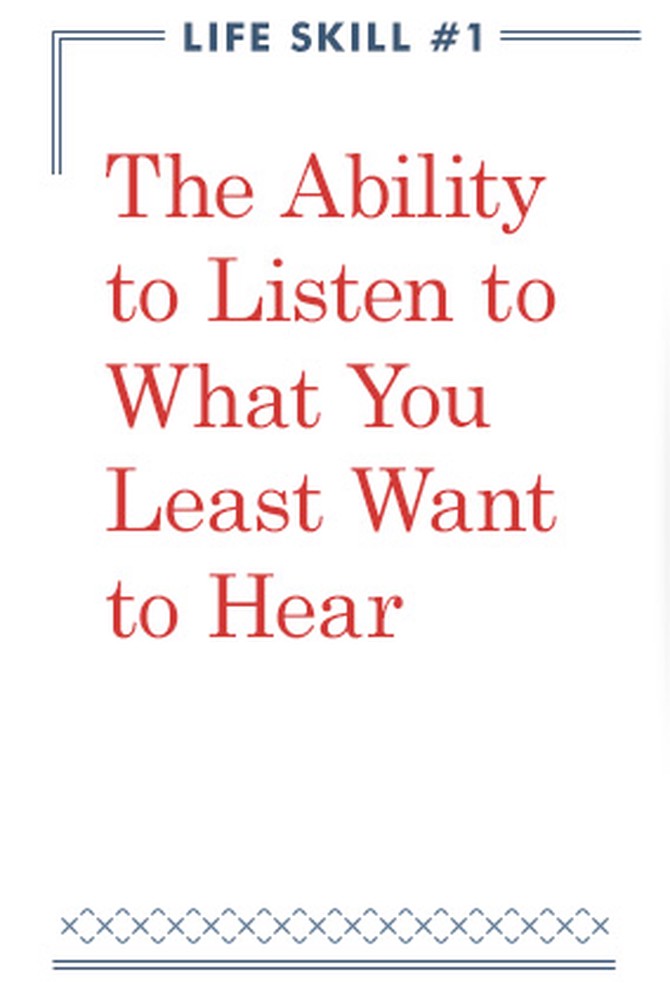
Illustration: Jen Troyer
Occasionally friends, family and—in rare cases—strangers lose their minds and tell us what they really think about our lives. Sometimes it’s on purpose, and sometimes it just burbles out due to frustration or one too many glasses of rosé in the backyard. “You’re in an unhappy marriage,” they say, or, “You’re so nervous about what’s going to happen with your job that you ruin every meal we spend together.”
In response, we can smile tightly and say, “that’s something to think about!” (while listing in our heads all the reasons this person is wrong, so wrong). Another option? Agreeing with them for a split second, only to go home and suffer a case of spontaneous emotional amnesia, during which the conversation is permanently slashed from our memory.
We don’t have to do anything about this horrible, crappy piece of information. But we can just sit there and get used it, sort like how you got used to a college roommate who yelled all night in her sleep and stole your sweaters out of the closet. It may turn out that you disagree with her particular opinion, but even so, it enriches you know about it, because this is how somebody other than yourself sees the situation, and maybe it’s either time to get some distance from that jealous, unkind person or to understand that fear or love sometimes clouds her judgment. On the other hand, you may also end up agreeing with her, which is when you get a chance to listen to yourself—and decide what you want to do about taking some action.

Illustration: Jen Troyer
I met my best friend at a dinner party. She was wearing a leather jacket. She smelled like a blend of peppermint and cancer, which is what menthol cigarettes really smells like when you get too close. When I told a joke—which is what I do when I’m stuck at a long, candlelit table full of strangers and nervous out of my mind—she smiled in a way that told me she was funnier, she just didn’t feel like being funny right then. Or talking to me, either.
"That Michelle! What a snooty stinkball!" I thought. A few days later we bumped into each other and she gave me a novel from her bag that I’d mentioned I’d wanted to read. A week later, when I returned it, she explained that she was going to AA and having a rough time and didn’t know how to socialize yet, not without 42 glasses of Scotch. What I had perceived as dislike on her part was the same thing I was feeling—terror of a row of looming, unknown faces.
Round One—whether it’s meeting a friend for the first time or dating somebody for the first time or having sex for the first time—is exactly when things are most likely be completely awkward, stilted and even discouraging. Nobody knows what they’re doing. Unfortunately, it’s also the time we’re most likely to toss off a judgment and move on. Those of us, however, who master giving everybody a pass on this encounter are the ones most likely to progress to Round 2 and Round 2002—which are the times when both of you are fully accepted and understood, menthols, bad jokes and all.
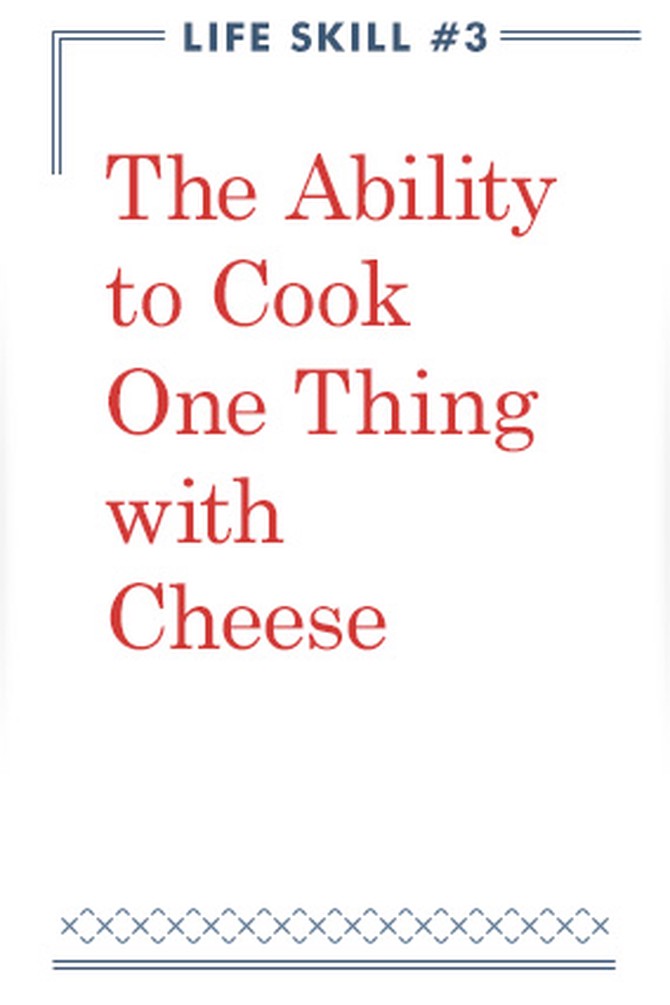
Illustration: Jen Troyer
Most people show their love and appreciation with baked goods. My husband is always bringing people oatmeal-raisin cookies, for example. Nobody dislikes you after an oatmeal-raisin cookie. However, there are also people on this planet who can’t bake—an activity which requires precision with measuring cups and a little stamping tyrant in your brain who will not let you blow off the word "sift."
For years, I tried (and failed) to master German chocolate cake. One day, I said to myself: "Why am I making this stupid cake? I don’t even like cake." A little Roman candle of understanding blasted through me: "I don’t like cake! I like macaroni and cheese! I like lasagna!"
You can’t create what you don’t dream of—mostly because creations come out of your most intimate longings. I began making what I liked for the Sunday coffee hour after church and, after a brief pause to understand why pesto pizza was being served at 11 a.m., people gobbled it up as if it had been lemon bars. Learning to cook a really delicious, decadent thing for others is not just a way to show your affection—it’s a reminder that when you do what you love, you pretty much always do it with excellence.
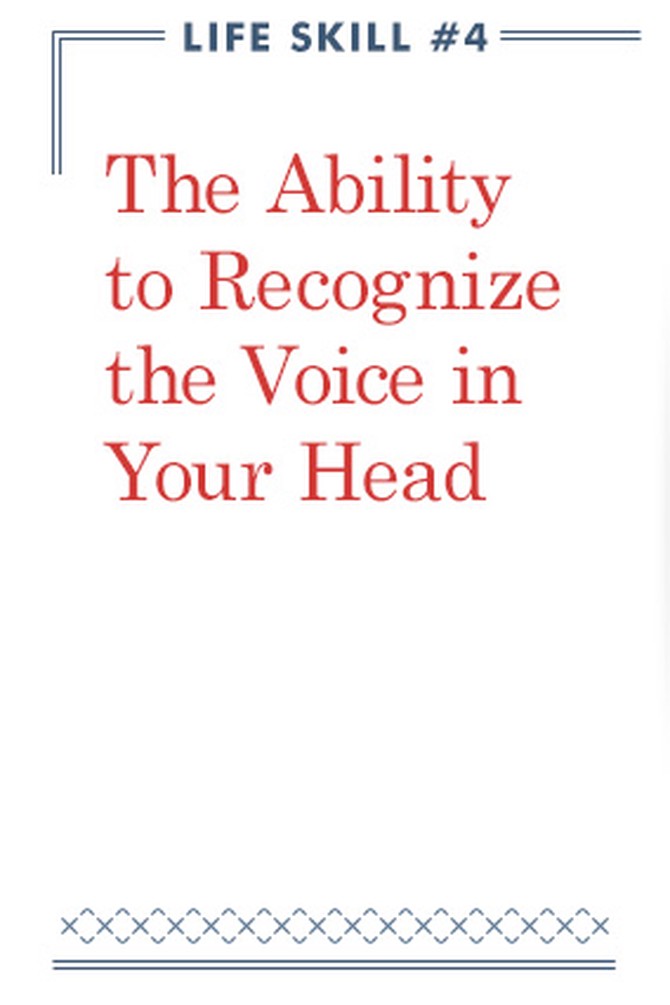
Illustration: Jen Troyer
You know the voice, don’t you? It criticizes what you did and didn’t do. Then it criticizes what other people did or didn’t do. Then it complains why everybody else has pulled it together except for you. Then it tells you to worry about your car dying or your house burning down or your losing your job due to a sudden downturn in the world economy, which hasn’t happened yet but will. Then it says you’re wasting everybody’s time by being worried. In fact, it says, you’re putting your marriage in jeopardy and scarring the kids because you’re thinking about a recession instead of playing Legos on the floor with them.
That voice is your ego talking. The sooner you can recognize that voice for what it is—your thoughts on your life and not your life—the sooner you can start actually living. (Need more details? See Eckart Tolle and Lifeclass)
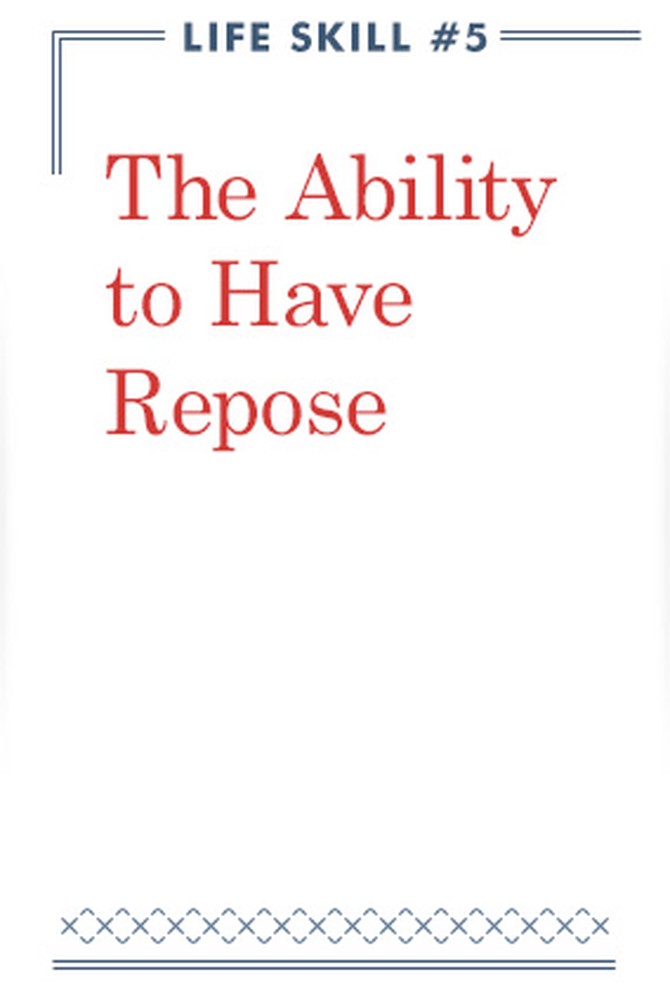
Illustration: Jen Troyer
I’ll admit it: I haven’t mastered this one yet. It comes from Tender Is the Night by F. Scott Fitzgerald. In that insightful book, the hero, Dick Diver, and his friends carefully studied the wealthy patrons entering a restaurant. At one point, a well-dressed, seemingly self-assured American came in. "Suddenly, he perceived that he was being watched—whereupon his hand rose spasmodically and arranged a phantom bulge in his necktie." At another table, people patted their "shaven cheeks," smoked unlit cigars, fingered eyeglasses and "even pulled desperately at the lobes of their ears."
What Dick was looking for—but didn’t find—in these strangers was "repose." The novel was set in the 1930s, but we still feel the same nervousness today, the same impulse to perform, just in case somebody is watching. We fiddle with cell phones or shove earplugs into our ears, when we could just sit quietly, at ease.
Repose is still a fantasy for me. I imagine it as something akin to how you act when you’re with somebody who you really love and who loves you back. With this person, you’re not concerned with your hair; you don’t have to adjust your tone of voice or your sandal strap. You’re not on stage. What would it be like to be this way when you’re all by yourself?
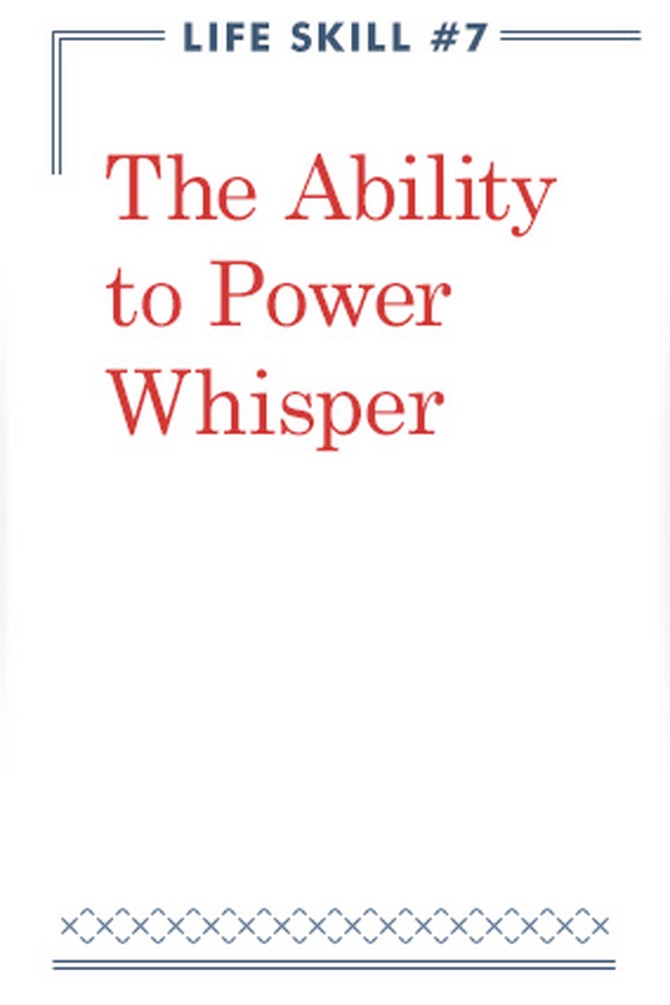
Illustration: Jen Troyer
A kindergarten teacher I once knew used to look out across the crowded, paint-flecked insanity of her classroom, ring a tiny silver bell and whisper, "Come, children." Instantly, all 22 raging 5- and 6-year-olds ran up to the carpet, sat down and went completely silent. When you think about it, it makes sense. Why wouldn’t these kids behave this way? They’ve had plenty of people in their lives yelling at them to brush their teeth or to stop hitting their brother. Whispering was different—and, thus, interesting.
The same holds true for grown-ups. We live in the age of the screaming TV, the beeping smartphone, the blaring car alarm. Lowering your volume gives others the rare and delightful pleasure of leaning in to hear what’s being said, of being invited (not ordered!) to pay attention. You want others to want to hear you.

Illustration: Jen Troyer
Who doesn’t do it? We see people we like, and we tell them we love their haircut or their sundress or their house or their beautiful German shepherd. It makes them feel good. It makes us feel good for making them feel good. And probably, the reason why we engage in this activity to begin with, is that we like the person, and when you like somebody, so much of what they buy, wear, arrange, choose and look like is fascinating.
On the other hand, telling somebody you admire how she kept her self-control and didn’t yell at her daughter after knocking an entire 2 pound sack of quinoa onto the floor, or that you loved how she stood up to the window-screen man who tried to charge her $700 for one screen and called her "Little Lady," takes just a bit more effort—and observation. It results, however, in somebody having one of the most amazing experiences on the planet—being seen. When you give this gift to somebody, you prove to them that all that stuff they are doing inside, all that trying to be the best person they can be (despite their past, their flaws, their doubts, their occasional total meltdown) is not in vain.
Next: 6 perfect times to tell the painful, ugly truth
Published 07/17/2012


